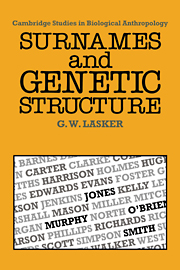Book contents
- Frontmatter
- Contents
- Preface
- 1 Introduction
- 2 History of surname studies in human biology
- 3 Sources of data
- 4 Methods
- 5 Isolates and inbreeding
- 6 Island versus distance models: the Far East and Oceania
- 7 The Americas and continental Europe
- 8 Scotland and Ireland
- 9 Regions of England
- 10 English cities and the general population of England and Wales
- 11 Specific surnames in Great Britain
- 12 Human population structure
- Literature cited
- Appendix maps and diagrams, of the distribution of 100 surnames in England and Wales
- Glossary
- Index
8 - Scotland and Ireland
Published online by Cambridge University Press: 05 November 2011
- Frontmatter
- Contents
- Preface
- 1 Introduction
- 2 History of surname studies in human biology
- 3 Sources of data
- 4 Methods
- 5 Isolates and inbreeding
- 6 Island versus distance models: the Far East and Oceania
- 7 The Americas and continental Europe
- 8 Scotland and Ireland
- 9 Regions of England
- 10 English cities and the general population of England and Wales
- 11 Specific surnames in Great Britain
- 12 Human population structure
- Literature cited
- Appendix maps and diagrams, of the distribution of 100 surnames in England and Wales
- Glossary
- Index
Summary
The surnames of Scotland, Ireland, Wales and England have somewhat different histories and therefore vary in time of origin and in geographic distribution patterns.
Highland Scotland had clan names rather than hereditary surnames. After the defeat of the clans at the battle of Culloden in 1746, however, the transition was rapid; many Scots in the border region took English-sounding surnames, and Scottish names became more frequent in England. Many Scottish surnames are indistinguishable from Irish ones and the difference between Mac and Me is of little help. These prefixes indicate that the surnames of which they are a part arose from clan names or patronymics (that is, from a father's given name).
In Ireland the clan names apparently go back throughout historic times. Eventually some were Anglicized and the O' was often dropped. Many names of Norman origin also took root in Ireland. More recent migrants to Ireland were often Protestants and they carried different surnames that are usually distinct from those derived from the old clans. The clan names, at first closely associated with particular counties, spread to other areas but are still sometimes more frequent in their area of origin than elsewhere in Ireland. Names of non-Irish origin were usually introduced into large towns and cities, such as Dublin, and of course names of Protestants from Scotland are most frequent in Ulster.
- Type
- Chapter
- Information
- Surnames and Genetic Structure , pp. 50 - 53Publisher: Cambridge University PressPrint publication year: 1985

